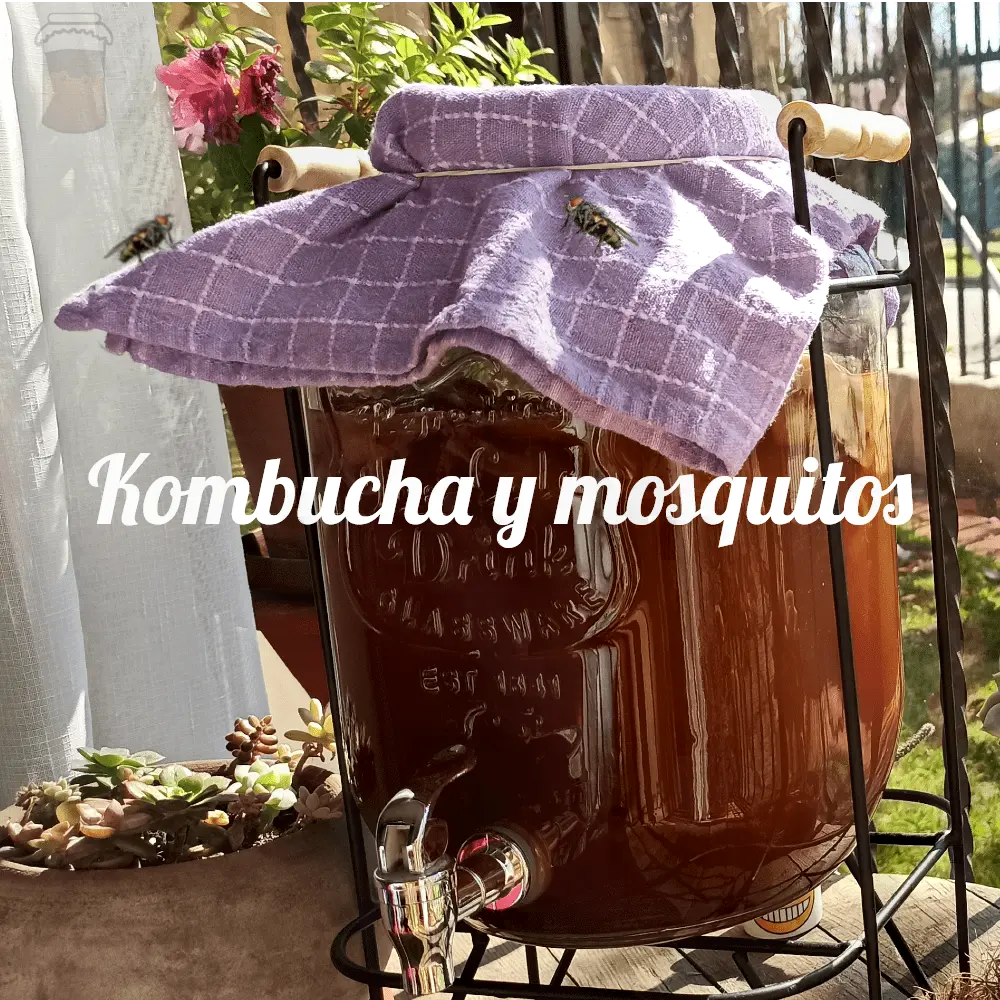These annoying insects can ruin a good day, and little do some know about what there may be for some people, environments and even food to be so attractive, in several studies the reasons why mosquitoes prefer one person more than another and one of these reasons has to do with what you consume, And in that aspect to know what relationship exists between kombucha and mosquitoes.
Certain components can attract various insects and, depending on their life cycle or sex, may have different nutritional requirements. Some nutrients in kombucha could draw the attention of these and possibly attract them to us, although in other cases the opposite has been shown to repel them.
It is curious, but it can have different effects depending on how the drink is prepared, some compounds produced (lactic acid) can generate an attractive smell or similar to that of human skin after exercise, which capture the attention of mosquitoes. Therefore, certain precautions must be taken to avoid bites and the invasion of these in the drink.
Contents
Kombucha and mosquitoes Why are they attracted?
It is possible that several components of kombucha can attract the attention of mosquitoes, even making your skin more attractive to these insects, such as acetic acid, alcohol, the smell of tea or fruity aromas, carbon dioxide, etc.
All these components are produced during the fermentation of kombucha where, despite its health benefits, they can have unwanted effects, one of these is the increased risk of mosquito bites and contamination of the drink during its preparation. [1] [2]
Among the components that attract mosquitoes we have:
Lactic acid
One study found that lactic acid strongly attracted mosquitoes, primarily Aedes aegypti (yellow fever mosquito). [3] [4]
Kombucha tea has an acidic taste and smell from this compound, along with acetic and gluconic acid, in different tests the examiners mainly detected the smell of tea, lemon and acid, to a lesser extent acetic acid and yeast. Even so, these aromas, depending on the amount, can be noticeable and attract mosquitoes to the drink. [5]
Ethanol
In other studies it was observed that there was an increase in the landing of mosquitoes on the skin of volunteers after consuming alcohol compared to before doing so. Clearly showing that drinking alcohol stimulates the attraction of mosquitoes.
Therefore, care must be taken since when consuming alcohol there is a greater risk of mosquito bites and therefore in the transmission of diseases. [6]
Sweat ethanol content and skin temperature were not found to show any correlation between alcohol ingestion and mosquito landings. 6
Although, there is no risk with traditional kombucha since it only has 0.5% alcohol, care should be taken with the consumption of hard kombucha prepared to have percentages of 3-11% alcohol, being more likely to attract mosquitoes. [7]
Carbon dioxide (CO2)
CO2 plays an important role in the process of searching for hosts by mosquitoes, where people who exhale a high amount of CO2 will be mostly affected, but it was also found that CO2 produced by yeasts is able to attract them. [8]
The tea used to prepare kombucha is fermented with yeast, this process generates CO2, so the risk of contamination by mosquitoes increases during and longer fermentation time.
Carbohydrates
Carbohydrates are also very attractive to mosquitoes, since they are larvae and throughout their lives, they need a sugar meal to survive. [9]
When you start preparing kombucha, it has a considerable amount of sugar that is reduced during fermentation.
This may mean that, at the beginning of fermentation, the risk of being invaded by mosquitoes is due to the different sugars present and then being attracted to the lactic acid formed at the end.
Can used as a cosmetic on the skin attract or repel mosquitoes?
The microorganisms found on the skin can determine human odor, and depending on the metabolic conditions of these, they can generate aromas that attract mosquitoes.
For example, Staphylococcus species are associated with bad foot odor that is attractive to mosquitoes and, Corynebacteria and Propionibacterium can produce acids capable of attracting Anopheles Gambiae (Mosquito that transmits malaria)
Therefore, inhibiting the metabolism of certain skin bacteria can reduce a person’s attractiveness to mosquitoes, including malaria transmitters. [10]
Kombucha produces a high concentration of acids that generate an inhibitory environment that prevents the growth of other unwanted microorganisms, acetic acid being the most remarkable. 2
From the above, it could be inferred that in this way kombucha could repel them, although research is needed to evaluate this hypothesis.
Some medicinal plants such as lavender, jasmine, lemon, chamomile, turmeric, etc., are effective as natural repellents of different species of Anopheles mosquitoes with 8h of protection.
When kombucha is prepared with other compounds (such as those already mentioned) it is able to acquire some of its properties and, although it has not been tested, it is possible that they also acquire their repellent action. [11]
Can it prevent mosquito-borne diseases?
There is a relationship between the intestinal microbiota and the immune system in the elimination of parasites that impairs the development of their respective pathological processes, including those diseases transmitted by mosquitoes.
It is considered that functional foods with probiotics may be useful in the prevention and control of infectious diseases.
Fermented foods with desired properties and appropriate modified bacterial strains may be important in improving the prevention and control of malaria (mosquito-borne) and other infectious diseases, as observed in experimental rodent studies. [12] [13]
The development of probiotics that can be offered in stable foods for maintenance may facilitate distribution and administration in cases of disease.
The use of kombucha tea and cocoa kombucha have antioxidant and anti-plasmodium activities (malaria parasite) which results as a possible food for the prevention of malaria. [14]
How to avoid mosquito contamination?
Special care should always be taken during the preparation of kombucha because of the risk of contamination, so prevention measures before, during and after brewing are crucial to avoid any risks.
When kombucha is prepared after adding the starter, it is recommended to ferment at temperatures of 20C ° to 26 C °, since these temperatures will benefit the production of acetic acid achieving the antimicrobial effect, which as we said, can work as a repellent or pesticide. [15]
It is important that you use a cloth or paper towel (it must allow air circulation) to prevent mosquitoes from entering the container, «sealing» with an elastic band as tight as possible.
Also after fermentation it should be refrigerated, if the kombucha is left covered longer than recommended at room temperature it could result in the accumulation of carbon dioxide, which would not only attract mosquitoes but could also generate the explosion of the contents. [16]
It also appears that it may be helpful to use mosquito nets at home or near starter cultures to protect them during storage or fermentation.
I hope this information has helped you to solve your concerns. Of course, as there is a lot of high-quality information on this website, I suggest you take a look at the following articles.

